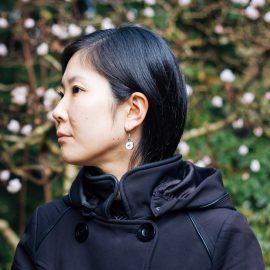Ayaka Yoshimizu
Research Area
Education
B.A., Keio University
M.A., Simon Fraser University
PhD., Simon Fraser University
About
Ayaka Yoshimizu is an Associate Professor of Teaching at the Department of Asian Studies. She also teaches and coordinates Arts courses for the UBC-Ritsumeikan Exchange Programs. Ayaka teaches courses on transpacific histories and cultures, Indigeneities in Asia and Asian diaspora, and anti-colonial, anti-racist, and embodied methodologies. She is affiliated with Asian Canadian and Asian Migration Studies and Centre for Migration Studies.
Ayaka is an interdisciplinary scholar trained in cultural studies, media and communication studies, and embodied, sensory, and performative ethnographic methodologies. Her research is concerned with transnational migration within Asia and across the Pacific Ocean; carceral and precarious mobilities; migrant women in the sex trade; politics of memory and memorialization; sensory studies; performance ethnography; and transnational and diasporic spaces and cultures.
Ayaka is the author of Doing Ethnography in the Wake of the Displacement of Transnational Sex Workers in Yokohama: Sensuous Remembering (Routledge, 2022) and a co-author of Migration and the Politics of Methodology: Doing Fieldwork, Decentring Power, and Foregrounding Migrants’ Perspectives (Routledge, 2025). Her current SSHRC funded project looks at memorial sites, objects, and practices that commemorate the deaths of Japanese sex workers involved in transnational and interracial sex trade in the late 19th century through early 20th century in the transpacific world. She is a co-creator of a bilingual and multimodal website Sex and Migration in the Transpacific Underground, which offers an open educational resource that engages transpacific histories of interracial sex, intimate labour, and migration. The website brings together various Japanese-language archival materials with English translation along with teaching modules that can be implemented in courses in Asian Studies, Asian Diaspora Studies, Transnational History, Gender, Studies, Migration Studies and more.
Teaching
Research
Areas of Disciplinary Research:
Transpacific memories; migration studies; Asian-Indigenous relations; sensory studies; performance ethnography
Areas of Pedagogical Research and Projects:
Anti-colonial and anti-racist approaches to teaching, curriculum development, and international education; embodied narrative as pedagogy; Indigenizing teaching and learning
Publications
Books:
Co-editor, with Kirsten Emiko McAllister and Daniel Ahadi. Migration and the Politics of Methodology Doing Fieldwork, Decentring Power, and Foregrounding Migrants’ Perspectives. Routledge, 2025.
Doing Ethnography in the Wake of the Displacement of Transnational Sex Workers in Yokohama: Sensuous Remembering. Routledge, 2021.
Journal Articles:
Co-author, with Saori Hoshi, “Transmediating Race and Senses through Subtitling in Translanguaging Classroom.” Multimodality & Society 3(3), 2023: 210-233.
“Student-centered, ‘Embodied Inter-referencing’ as Antiracist and Anticolonial Pedagogy.” Asia Pacific Education Review, 2022.
“Unsettling Memories of Japanese Sex Workers: Carceral Mobilities of the Transpacific Underground at the Turn of the 20th Century.” Topia: Canadian Journal of Cultural Studies, 43, 2021: 24-43.
“Doing Performance Ethnography among the Dead, Remembering Lives of Japanese Migrants in Transpacific Sex Trade.” Performance Matters 4(3), 2018: 137-154.
Co-author, with Julia Aoki, “Walking Histories, Un/making Places: Walking Tours as Ethnography of Place.” Space & Culture 18(3), 2015: 273-284.
“Bodies That Remember: Gleaning Scenic Fragments of A Brothel District in Yokohama.” Cultural Studies, 29(3), 2014: 450-475.
“Nanay: Drawing a New Landscape of Diasporic Mothers.” Topia: Canadian Journal of Cultural Studies, 27, 2012: 153-172.
“Chopsticks, Phone-Bells and Farms: Fuyuko Taira’s Diasporic Spatial Practice.” Gender, Place, and Culture, 19(3), 2012: 313-326.
“‘Hello, War Brides’: Heteroglossia, Counter-Memory, Auto/biographical Work of Japanese War Brides.” Meridians: Feminism, Race, Transnationalism, 10(1), 2010: 111-136.
Book Chapters
“Re-imagining Migration and Communication Studies through Fieldwork in Transnational Yokohama.” In Migration and the Politics of Methodology. London: Routledge, 2025.
Co-authored, with Kirsten Emiko McAllister and Daniel Ahadi. “Migration and the Politics of Methodology: Doing Fieldwork, Decentring Power, and Foregrounding Migrants’ Perspectives.” In Migration and the Politics of Methodology. London: Routledge, 2025.
“Staging Unmemorials, Being Haunted: The Grievability of Japanese Sex Workers in the Transpacific Underground.” In Routledge International Handbook of Sensory Ethnography. London: Routledge, 2024.
Hoshi, Saori & Yoshimizu, Ayaka. “Promoting Translingual and Transcultural Literacies in a Collaborative Content-Based Japanese Classroom: Audiovisual Translation as Pedagogy.” A Transdisciplinary Approach to Chinese and Japanese Language Teaching. Routledge, 2023.
Aoki, Julia & Yoshimizu, Ayaka. “Walking, Sensing and Making Places: A Reflection on Ethnography of Walking in Yokohama and Vancouver.” Communication, culture, and making meaning in the city: Ethnographic engagements in urban environments (pp.111-125). Lanham: Lexington Books, 2017.
“Bodies That Remember: Gleaning Scenic Fragments of A Brothel District in Yokohama.” In Scene Thinking: Cultural Studies from the Scenes Perspective. Abingdon, Oxon: Routledge, 2017. [Reprinted from Cultural Studies]
“‘Affective Foreigners Save Our Elder Citizens’: Media Discourse of Indonesian Migrant Workers in Japan.” In The Political Economy of Affects and Emotions in East Asia (pp.137-153). London; New York: Routledge, 2014.
Public-Facing Activities and Contributions
Open Educational Resource
Sex and Migration in the Transpacific Underground
Innovative and Inclusive Teaching of UBC Instructors with Disabilities: Compiling and Sharing Existing Knowledge and Best Practices
Project Outcomes:
- Annotated Bibliography on Teaching and Learning with Disabilities and Illnesses in Higher Education
- UBC’s Accessibility and Support for Disabled Instructors Survey 2021
- Challenges and Best Practices of Disabled Instructors at UBC
- CTLT Winter Institute Workshop, What Would an Accessible University Look Like? Perspectives of Disabled Instructors at UBC
- CTLT Spring Institute Workshop, The Return to Campus and Accessibility: Perspectives of Disabled Instructors
UBC Transdisciplinary Symposium of Disability Research, Education and Activism (April 17, 2023)
